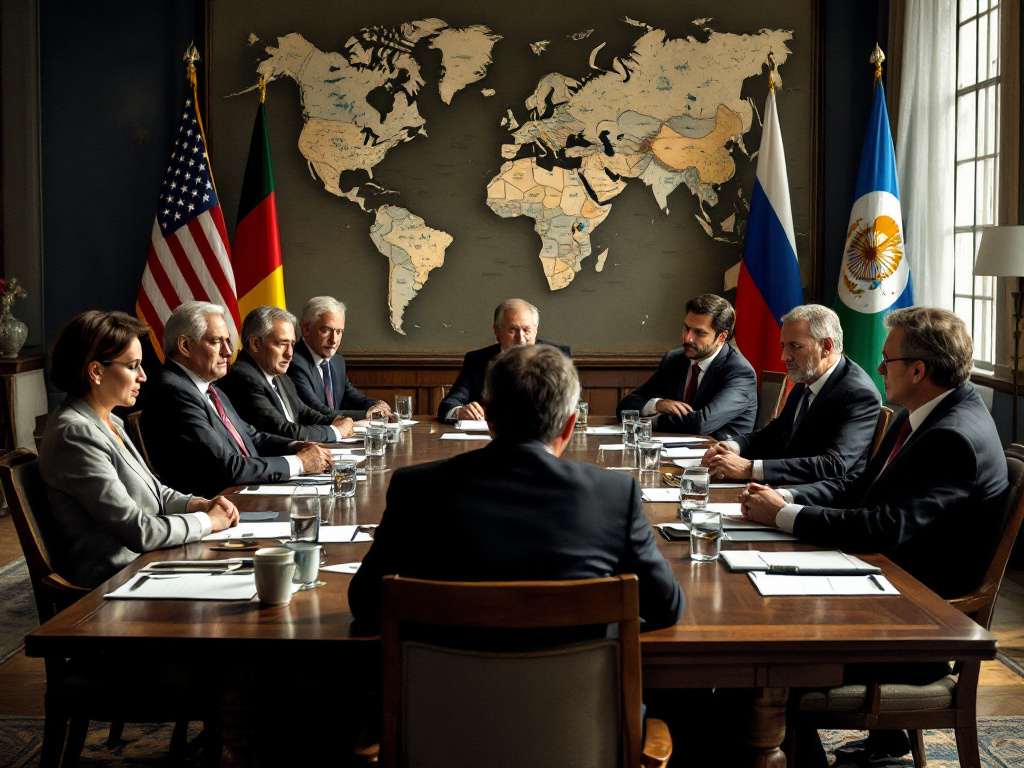Articles in this Cluster
17-04-2025
Despite mixed messages from the Trump administration on whether it wants Iran to completely dismantle its nuclear program, Iranian officials said they will continue participating in nuclear talks with the US, focusing on private negotiations rather than public statements. Iranian Foreign Minister Abbas Araghchi and US special envoy Steve Witkoff are set to hold a second round of talks in Rome. Araghchi stated that Iran's nuclear enrichment for peaceful energy is "nonnegotiable" but is willing to build trust regarding potential concerns. The US has sent conflicting signals, with Trump saying he doesn't want Iran to weaponize its program, while National Security Adviser Michael Waltz said Iran must dismantle its enrichment program.
17-04-2025
The US will hold high-level talks in Paris with European counterparts to discuss efforts to end the war in Ukraine, with attendees including US special envoy Steve Witkoff, top diplomat Marco Rubio, and UK Foreign Secretary David Lammy. The focus will be on ending the fighting and European diplomats are expected to urge the US to pressure Russia into an unconditional ceasefire, with Witkoff reporting on his recent meeting with Russian President Vladimir Putin.
17-04-2025
President Donald Trump stated that Iran must abandon its concept of obtaining a nuclear weapon ahead of a second round of talks with the US, scheduled to take place in Italy the following Saturday. Trump made the comments while meeting with El Salvador's President Nayib Bukele in the Oval Office, reiterating that Iran "cannot have a nuclear weapon." The first round of talks between the US and Iran took place in Oman the previous Saturday and were described as "very positive and constructive" by the White House, although "complicated" issues remain unresolved. Trump has threatened military action if Iran does not stop its nuclear ambitions, but also expressed optimism that the issue could be resolved diplomatically, comparing it to ending Russia's war in Ukraine.
17-04-2025
Iran has expressed frustration over the change of location for its nuclear talks with the US from Oman to Italy, with a foreign ministry spokesperson saying the "goalposts were being moved" and blaming "hawks" for the decision. The talks, which are aimed at addressing concerns over Iran's nuclear programme, were initially set to resume in Oman but will now take place in Rome. Iran's foreign minister, Abbas Araghchi, has stated that the country's right to enrich uranium is non-negotiable, while the US has imposed new sanctions targeting shipping companies' oil tankers under its Iran-related programme.
17-04-2025
President Trump decided against supporting an Israeli strike on Iranian nuclear sites, opting for diplomacy instead, after internal debates within his administration. Israel had planned to attack Iran in May, but required US assistance to ensure success and defend against Iranian retaliation. Trump informed Israeli Prime Minister Netanyahu of his decision to pursue negotiations with Tehran, setting a deadline of a few months to limit Iran's nuclear program. The decision came after months of debate between hawkish cabinet officials and aides skeptical of military action, with some warning that it could lead to a larger war. The US had been preparing for potential military action, moving equipment to the Middle East, including aircraft carriers and bombers, but ultimately chose to prioritize diplomacy.
17-04-2025
US Vice President JD Vance stated that Europe should take more responsibility for its own security, as it has been a "security vassal" of the US for too long. He emphasized the cultural ties between the US and Europe but criticized European countries for not having sufficient military capabilities. Vance also discussed the war in Ukraine, rejecting claims that the Trump administration supports Russian narratives, and suggested understanding both sides' strategic objectives to end the conflict. Regarding trade, Vance defended Trump's tariffs, saying they aim to reduce the US trade deficit, and hinted at flexibility in negotiations. He expressed optimism about a potential US-UK trade deal due to their "reciprocal relationship" and cultural affinity.
17-04-2025
European officials are seeking direct communication with President Trump, as they are skeptical that his aides accurately represent his views. They believe that Trump is the ultimate decision-maker and that his officials are more focused on fulfilling his wishes than engaging with European allies. European leaders have found it more effective to communicate with Trump through special envoys and advisers, such as Elon Musk, rather than traditional diplomats. The Trump administration has been criticized for being unilateral and not consulting with European allies, particularly on issues like trade and defense. Some European leaders, like Italian Prime Minister Giorgia Meloni, have managed to secure meetings with Trump, but others, such as European Commission President Ursula von der Leyen, have been unable to do so. The lack of clear communication channels and Trump's mistrust of multilateral institutions have created uncertainty and tension in European-American relations.
